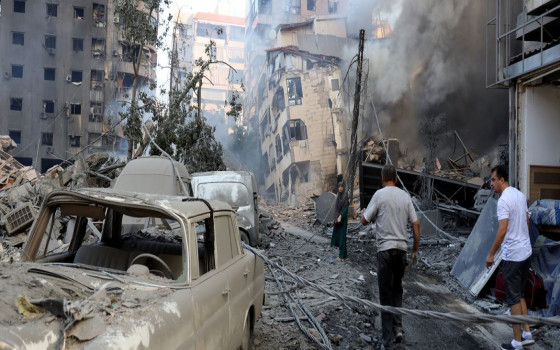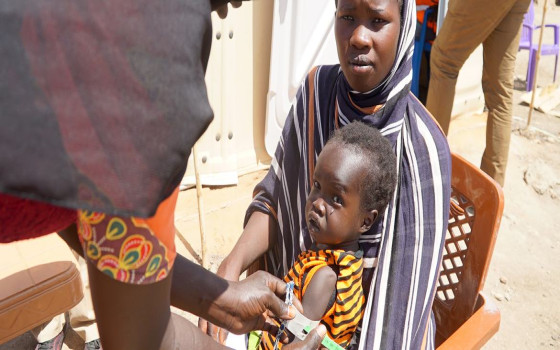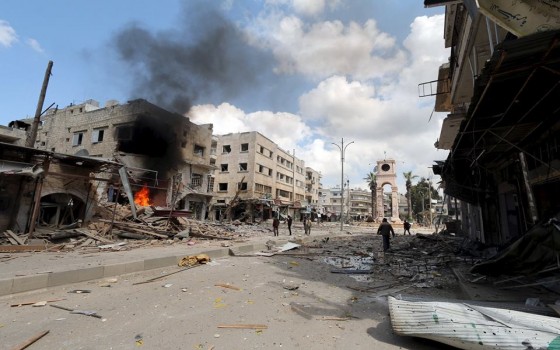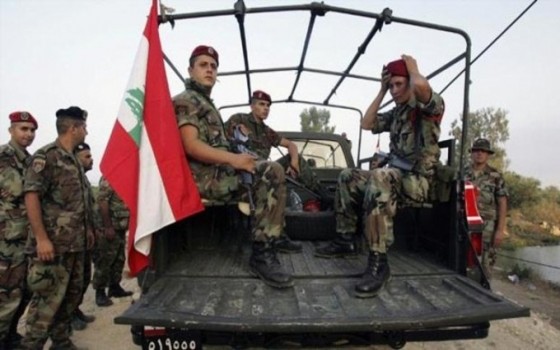The United Nations addresses world leaders to act to avoid catastrophic crises in Gaza, Lebanon and Sudan

- Europe and Arabs
- Saturday , 26 October 2024 12:19 PM GMT
Capitals: Europe and the Arabs
The UN High Commissioner for Human Rights, Volker Türk, said that the darkest moments of the conflict in Gaza are unfolding in the north of the Strip, where the Israeli army is exposing the entire population to bombardment, siege and the risk of starvation, as well as forcing them to choose between mass displacement or being trapped in an active conflict zone.
In a press statement issued yesterday, Friday, Türk added that "the situation is getting worse day by day in an unimaginable way. The policies and practices of the Israeli government in northern Gaza threaten to empty the area of all Palestinians. We are facing what could amount to atrocity crimes, including what may amount to crimes against humanity."
Türk also referred to reports that Palestinian armed groups continue to operate among civilians, including in shelters, putting civilians at risk, stressing that this is absolutely unacceptable.
Access to the north is very limited, he said, adding that “the Israeli army is bombing hospitals. Staff and patients have been killed, injured or forced to evacuate at the same time. Shelters, which were formerly schools, are being bombed daily. Contact with the outside world remains extremely limited. Journalists continue to be killed.”
“Under the Geneva Conventions, States have an obligation to act when a serious violation of international humanitarian law has been committed. Under the Genocide Convention, States Parties also have a responsibility to act to prevent such a crime when there is an imminent risk of such a crime,” the High Commissioner said.
He appealed to world leaders, saying: “I remind you of your responsibility to ensure respect for international humanitarian law as set out in the Geneva Conventions. These are universally accepted and binding rules designed to preserve a minimum of humanity. I appeal to you to put the protection of civilians and human rights first, and not to abandon a minimum of humanity.”
In Lebanon, “Lebanon is currently facing a humanitarian crisis of catastrophic proportions, with increasing civilian casualties, mass displacement and widespread destruction of civilian infrastructure across the country,” said the UN Special Coordinator for Lebanon, stressing that the protection of civilians must be a top priority.
UN official Jeanine Hennis-Plasschaert said in a press statement that those providing immediate response and responding to the call for assistance, including health workers and paramedics, have also been hit hard. She expressed deep concern about the increasing number of attacks on health facilities and workers.
Plasschaert noted that an Israeli strike earlier this week near the entrance to Rafik Hariri University Hospital (Lebanon’s largest government hospital) killed 18 people, including four children and four health care workers, while another hospital in the southern suburbs of Beirut was evacuated amid widespread panic over allegations that one of its buildings was being used. She stressed the need to make every effort to protect hospitals, under international humanitarian law, from any harm, "as every strike that affects the health care sector or takes another hospital out of service increases the pressure on an already exhausted health system, threatening the provision of vital medical services to the increasing cases." She stressed the need to protect health care workers who provide immediate response.
In his daily press conference, Farhan Haq, Deputy Spokesperson for the United Nations, expressed concern about a report that an Israeli shelling in Nabatieh hit an apartment housing journalists and other media workers. The Lebanese authorities confirmed that the shelling resulted in the killing of 3 people and wounding 3 others.
The UN official added: "We have recently witnessed attacks targeting the press. When journalists who are protected by international humanitarian law are targeted, this constitutes a threat to our fundamental rights related to freedom of information and expression."
She stressed that all parties to the conflict must respect their obligations under international humanitarian law, and said: "Even wars have rules."
UNIFIL
South of the Litani River, the United Nations Interim Force in Lebanon (UNIFIL) continues to report hostilities in its area of operations, with frequent incidents of direct and indirect fire on UN positions endangering peacekeepers.
The UNIFIL mission said it was taking intensive measures to protect the safety and security of its peacekeepers, but the security situation remained extremely challenging.
In Sudan, the UN High Commissioner for Refugees (UNHCR) and UNICEF warned of the continuing deterioration of the humanitarian crisis in Sudan, with millions of people in dire need of assistance. The agencies reported that 3.7 million children under the age of five are at risk of acute malnutrition this year.
The conflict in Sudan, which erupted on 15 April 2023, has displaced more than 11 million people, both internally and across borders, and pushed millions more into a state of extreme vulnerability, especially children.
Access to basic services – such as safe water, health care and shelter – is severely limited, and “as critical infrastructure collapses, the international response must be scaled up immediately to meet the sheer scale of needs,” said UNICEF Assistant High Commissioner for Operations Raouf Mazou and UNICEF Deputy Executive Director Ted Chaiban in a joint statement.
An estimated 13 million people are facing acute levels of food insecurity. Fourteen districts across the country are on the brink of famine, with famine conditions confirmed in Zam Zam camp in North Darfur.
The two officials said 3.7 million children under the age of five are expected to suffer from severe acute malnutrition this year alone and are in urgent need of life-saving treatment. They added that these children are already vulnerable due to hunger














No Comments Found